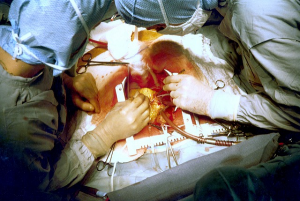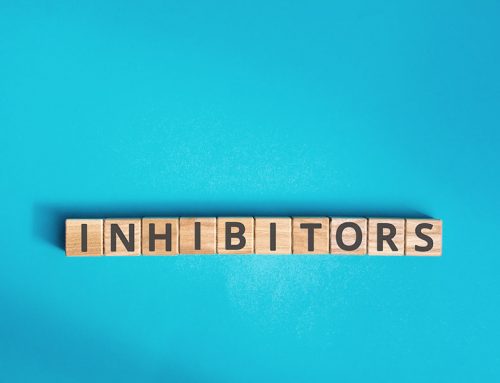Will you be having heart surgery soon? Do you know someone who will be? Pre-treatment with Q10 makes good sense according to a systematic review of several studies.
Q10 and chronic heart failure
We know from the Q-symbio clinical trial (1) and from the Morisco multi-center clinical trial (2) and from three good meta-analyses (3,4,5) that a well-absorbed Coenzyme Q10 preparation will have beneficial effects for chronic heart failure patients.
Q10in a daily dosage of 100 mg to 200 mg, taken with meals, should to reduce the risk of major adverse cardiovascular events, cardiovascular deaths, and hospitalizations, provided that the Q10 taken is a good formulation.
Q10 and absorption
We need to remember that Q10 is not a substance that is easy for the human intestinal system to absorb. As a raw material, it is a crystalline substance. The crystals do not get absorbed in the small intestine. The crystals have to be broken down into molecules of Q10 that can be packed into an oil-based soft-gel capsule and taken orally.
Okay, Q10 is very important as an adjuvant treatment for chronic heart failure patients. And we know that people taking statins need to supplement with Q10 because the statin disrupts the body’s production of Q10.
What about patients who are preparing to undergo cardiopulmonary bypass surgery? Should they ask their surgeons about taking Q10 before, during, and after their heart surgery?
Q10 and heart surgery – a systematic review
Yes is the answer from Dr. Fernando de Frutos of the Department of Cardiovascular Surgery at the University of Navarra in Pamplona, Spain. Dr. de Frutos and his team of researchers have done a systematic review of the literature on the use of Q10 with bypass surgery patients.
No evidence of adverse effects with Q10
In all, the researchers looked at the results of eight clinical trials. In none of the studies did they find any evidence of adverse effects of using Q10 with heart surgery patients.
Q10 in various durations and dosages before and after surgery
The use of Q10 with the heart surgery patients varied in their start and ending dates, their duration and their dosages. The dosages used in the eight studies ranged from 30 to 60 mg daily to 150 to 180 mg daily and all the way up to 300 mg daily.
In one study, the Q10 treatment started 14 days before surgery and continued 30 days after surgery. In two other studies, the Q10 treatment was started 5 to 7 days before the surgery. In a fourth study, the Q10 treatment was started only 12 hours before surgery, and it was a large administration of Q10: 600 mg.
Now, what were the outcomes of these administrations of Q10 to patients about to undergo heart surgery?
Statistically significant outcomes with Q10
Dr. de Frutos and the Spanish researchers found statistically significant reductions in the number of ventricular arrhythmias after surgery and in the need for inotropic drugs after surgery.
Inotropic drugs are drugs that affect muscle contraction, specifically, in this case the contraction of the heart muscle. These drugs have an effect on the speed and the force with which the muscles contract.
So, there were two statistically significant associations between the use of Q10 and post-surgery outcomes.
On two other outcomes after surgery, however, — length of hospital stays and incidence of atrial fibrillation –- the researchers did not find statistically significant reductions.
Q10 as a “prophylactic treatment”
Please remember that none of the studies showed any harmful effect at all of the use of Q10 with heart surgery patients. Given the proven safety of Q10 and given the record of a reduction of the need for inotropic drugs after surgery and a reduction in the incidence of ventricular arrhythmias after surgery, Dr. de Frutos and his researchers concluded that the use of Q10 should be considered as a “prophylactic treatment” for patients undergoing cardiopulmonary bypass surgery.
So, yes, if you or someone you know is meeting with a surgeon to plan a bypass operation, be sure to ask about taking Q10 prior to and following your surgery.
Sources:
- Mortensen SA, Rosenfeldt F, Kumar A, et al. The Effect of Coenzyme Q10 on Morbidity and Mortality in Chronic Heart Failure: Results From Q-SYMBIO: A Randomized Double-Blind Trial. JCHF. 2014;():. doi:10.1016/j.jchf.2014.06.008.
- Morisco, C., Trimarco, B., & Condorelli, M. (1993). Effect of coenzyme Q10 therapy in patients with congestive heart failure: a long-term multicenter randomized study. The Clinical Investigator, 71(8 Suppl), S134-S136.
- Soja, A., & Mortensen, S. (1997). Treatment of congestive heart failure with coenzyme Q10 illuminated by meta-analyses of clinical trials. Molecular Aspects Of Medicine, 18 SupplS159-S168.
- Sander, S., Coleman, C., Patel, A., Kluger, J., & White, C. (2006). The impact of coenzyme Q10 on systolic function in patients with chronic heart failure. Journal Of Cardiac Failure, 12(6), 464-472.
- Fotino, A., Thompson-Paul, A., & Bazzano, L. (2013). Effect of coenzyme Q₁₀ supplementation on heart failure: a meta-analysis. The American Journal Of Clinical Nutrition, 97(2), 268-275. doi:10.3945/ajcn.112.040741.










Should i still take fish oil had openvheart 8 months ago
Chris, please ask your cardiologist’s advice about the fish oil. I eat a lot of fish myself, herring for breakfast five times a week and baked fish for supper a couple of times a week. I will just mention that something I saw recently has made me want to take my Coenzyme Q10 at the other end of the day from when I eat my fish. In the same way, I am taking my Coenzyme Q10 and my vitamin C at different times of the day. I want to get as much absorption from the Coenzyme Q10 capsule as possible. I hope your cardiologist will have read Dr. Mortensen’s article about Coenzyme Q10 and heart failure patients in the December 2014 issue of the Journal of the American College of Cardiology Heart Failure specialist journal. Thank you and good luck, Richard
I had triple bypass 3 years ago I am 67 female should I take liquid q10 -100big a day? Does it help with cholesterol too?
Dayna —
The evidence from the Q-Symbio study is that 3 times a day (with meals) of 100 milligrams of Coenzyme Q10 in a soft-gel capsule significantly improves the symptoms and the survival.
We don’t have studies that show that Coenzyme Q10 reduces cholesterol, but we have several studies that show that people who take a statin medication need to take Coenzyme Q10 supplements because the cholesterol-inhibiting drugs also inhibit the body’s production of Coenzyme Q10. And it is very hard to get enough extra Coenzyme Q10 in the diet alone.
Thank you,
Richard